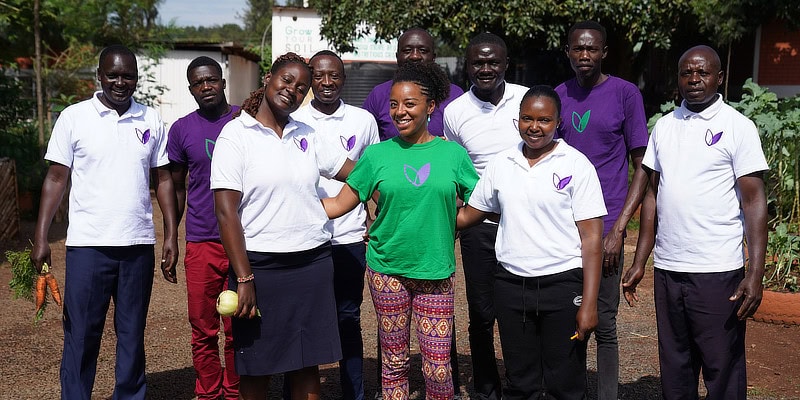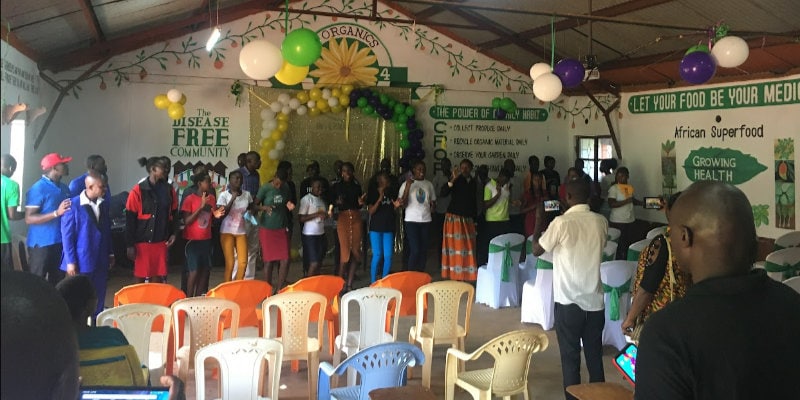What is your position at Thrive for Good and what do you do?
I’m a Senior Program Manager. I oversee Thrive’s global partnerships and the complete project management cycle of various projects such as; project design, PM&E, project implementation, and donors report.
Why did you want to work with Thrive?
Because I clearly see the need for good nutrition and the relevance of people taking care of their health with a good diet. I noticed that Thrive provides a method to produce healthy food while teaching people how to generate income to step out of poverty.
Why did you want to go to Africa?
My dad is from an African country; therefore, I have a connection with African people. I travelled to Kenya, Africa, to meet the team, to experience what it is to eat vegetables from life gardens, to see what a life garden within a community looks like and to hear living testimonies on how people use the knowledge they get to improve their lifestyles in different areas.
How did you help when you were there? What activities and work did you participate in?
I attended the training delivered by Thrive for new Growing Health Champions; to understand the methodology and how these types of trainings are provided. I visited some community gardens. While in Kitale I continued my daily online activities, coordinating the projects and designing the new working plans for partners. At the same time, I had meetings in person with our team in Kenya to improve internal reporting and processes with projects. One of the activities I participated in was the graduation of the cohort trained. It was fantastic to hear lessons learned, enjoy the food provided by the gardens at the training center and talk with the students about plans.
What were the people in the Thrive communities like?
I saw people enthusiastic about getting food in an organic way that will improve their lifestyle, and I noticed the appreciation and commitment they have to make the life gardens fruitful for all the people around.
What was the most memorable or rewarding part of the experience?
To see six female teenagers taking the training and committed to going back to their community to make a change through the creation of Life Gardens.
What was the most challenging part of the experience?
To walk around some places in Kitale and see so many poor people, I visited one of the slums in Kitale. It was extremely impressive to see people living in such reduced spaces, almost under garbage, kids around the houses without sanitation, and insects eating people’s skin. Some of them are starving with no hope. It broke my heart and made me realize how much work we could do to provide an option to humans, at least to eat and have another type of life.
What was the most surprising part of the experience?
To see how coordinated and organized the prisons are in Kitale, very clean and disciplined. I visited the female and male prisons to see how they work in the gardens. It was interesting to hear how the prisoners care for the gardens and feed themselves with the produce. I also saw the vast camps dedicated to the gardens and the guards in charge deeply committed to making them fruitful.
What do you most want people to know about what is going on in the communities Thrive helps?
The difference between Thrive and other organizations is that it gives these communities a healthy lifestyle with nutritious food that strengthens the body. The knowledge shared produces awareness of the importance of having good health to overcome other challenges in life and take care of their family members.
Why do you think it’s important for us here in North America (or other parts of the world) to support the work Thrive is doing?
We are blessed with the opportunity to go to any supermarket and find a variety of fruits and vegetables or attend any healthy restaurant. Healthy food is a luxury in some areas like those I visited in Kenya. Therefore for us receiving more in life is not a “privilege” but a responsibility to support anyone who doesn’t have access as we do. In this case, Thrive is the channel to reach so many people and has the strategy to provide them with tools not just to have food in their homes but to increase their health and generate an income.
Did this trip change you? If so, how?
Yes, reminding me of the relevance of good nutrition and how important it is to keep a healthy body to have a strong immune system, even more now with the pandemic we faced.
The trip increased my awareness of the actual impact Thrive has and how important it is to concentrate our efforts to support sustainable communities, not just in Africa but around the world, where access to healthy food is a challenge.




